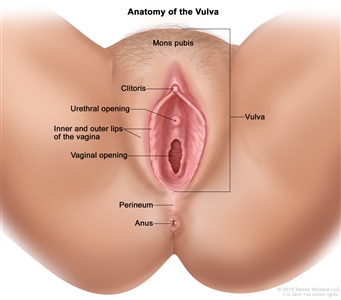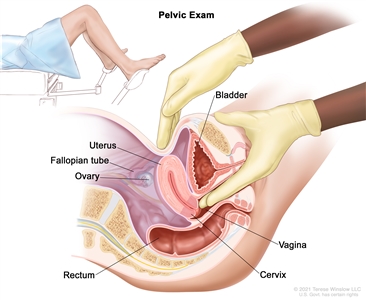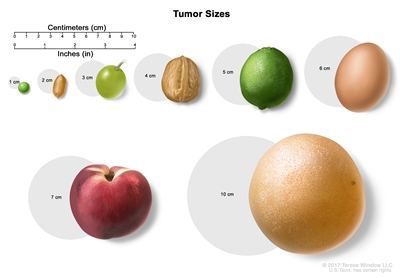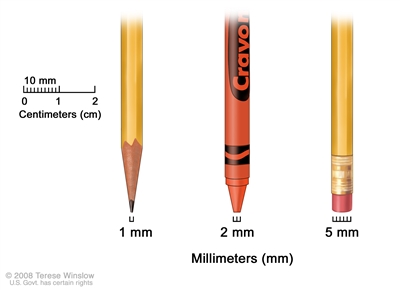Treatment Option Overview
There are different types of treatment for patients with vulvar cancer.
Different types of treatments are available for patients with vulvar cancer. Some treatments are standard (the currently used treatment), and some are being tested in clinical trials. A treatment clinical trial is a research study meant to help improve current treatments or obtain information on new treatments for patients with cancer. When clinical trials show that a new treatment is better than the standard treatment, the new treatment may become the standard treatment. Patients may want to think about taking part in a clinical trial. Some clinical trials are open only to patients who have not started treatment.
The following types of treatment are used:
Surgery
Surgery is the most common treatment for vulvar intraepithelial neoplasia (VIN) and vulvar cancer.
One of the following types of surgery may be done to treat VIN:
- Separate excision of a lesion: A surgical procedure to remove a lesion of concern.
- Wide local excision: A surgical procedure to remove the area of skin affected by VIN and some of the normal tissue around it.
- Laser surgery: A surgical procedure that uses a laser beam (a narrow beam of intense light) as a knife to make bloodless cuts in tissue or to remove a surface lesion such as a tumor.
- Ultrasound surgical aspiration: A surgical procedure to break the tumor up into small pieces using very fine vibrations. The small pieces of tumor are washed away and removed by suction. This procedure causes less damage to nearby tissue.
- Skinning vulvectomy: The top layer of vulvar skin where the VIN is found is removed. Skin grafts from other parts of the body may be needed to cover the area where the skin was removed.
The goal of surgery for vulvar cancer is to remove all the cancer without any loss of the woman's sexual function. One of the following types of surgery may be done to treat vulvar cancer:
- Wide local excision: A surgical procedure to remove the cancer and some of the normal tissue around the cancer.
- Radical local excision: A surgical procedure to remove the cancer and a large amount of normal tissue around it. Nearby lymph nodes in the groin may also be removed.
- Vulvectomy: A surgical procedure to remove part or all of the vulva:
- Modified radical vulvectomy: Surgery to remove most of the vulva. Nearby lymph nodes may also be removed.
- Radical vulvectomy: Surgery to remove the entire vulva. Nearby lymph nodes are also removed.
- Pelvic exenteration: A surgical procedure to remove the lower colon, rectum, and bladder. The cervix, vagina, ovaries, and nearby lymph nodes are also removed. Artificial openings (stoma) are made for urine and stool to flow from the body into a collection bag.
After the doctor removes all the cancer that can be seen at the time of the surgery, some patients may be given chemotherapy and/or radiation therapy after surgery to kill any cancer cells that are left. Treatment given after the surgery, to lower the risk that the cancer will come back, is called adjuvant therapy.
Radiation therapy
Radiation therapy is a cancer treatment that uses high-energy x-rays or other types of radiation to kill cancer cells or keep them from growing. External radiation therapy uses a machine outside the body to send radiation toward area of the body with cancer.
External radiation therapy may also be used as palliative therapy to relieve symptoms and improve quality of life.
Chemotherapy
Chemotherapy is a cancer treatment that uses drugs to stop the growth of cancer cells, either by killing the cells or by stopping the cells from dividing. When chemotherapy is taken by mouth or injected into a vein or muscle, the drugs enter the bloodstream and can reach cancer cells throughout the body (systemic chemotherapy). Topical chemotherapy for vulvar cancer may be applied to the skin in a cream or lotion. The way the chemotherapy is given depends on the type and stage of the cancer being treated.
See Drugs Approved to Treat Vulvar Cancer for more information.
Immunotherapy
Immunotherapy is a treatment that uses the patient's immune system to fight cancer. Substances made by the body or made in a laboratory are used to boost, direct, or restore the body's natural defenses against cancer.
Imiquimod is an immune response modifier used to treat vulvar lesions and is applied to the skin in a cream.
New types of treatment are being tested in clinical trials.
Information about clinical trials is available from the NCI website.
Treatment for vulvar cancer may cause side effects.
For information about side effects caused by treatment for cancer, visit our Side Effects page.
Patients may want to think about taking part in a clinical trial.
For some patients, taking part in a clinical trial may be the best treatment choice. Clinical trials are part of the cancer research process. Clinical trials are done to find out if new cancer treatments are safe and effective or better than the standard treatment.
Many of today's standard treatments for cancer are based on earlier clinical trials. Patients who take part in a clinical trial may receive the standard treatment or be among the first to receive a new treatment.
Patients who take part in clinical trials also help improve the way cancer will be treated in the future. Even when clinical trials do not lead to effective new treatments, they often answer important questions and help move research forward.
Patients can enter clinical trials before, during, or after starting their cancer treatment.
Some clinical trials only include patients who have not yet received treatment. Other trials test treatments for patients whose cancer has not gotten better. There are also clinical trials that test new ways to stop cancer from recurring (coming back) or reduce the side effects of cancer treatment.
Clinical trials are taking place in many parts of the country. Information about clinical trials supported by NCI can be found on NCI's clinical trials search webpage. Clinical trials supported by other organizations can be found on the ClinicalTrials.gov website.
Follow-up tests may be needed.
As you go through treatment, you will have follow-up tests or check-ups. Some tests that were done to diagnose or stage the cancer may be repeated to see how well the treatment is working. Decisions about whether to continue, change, or stop treatment may be based on the results of these tests.
Some of the tests will continue to be done from time to time after treatment has ended. The results of these tests can show if your condition has changed or if the cancer has recurred (come back).
It is important to have regular follow-up exams to check for recurrent vulvar cancer.



